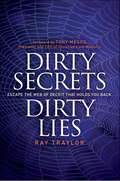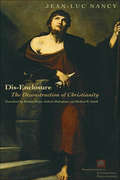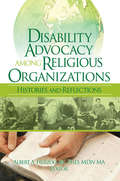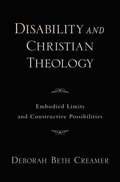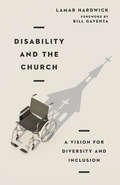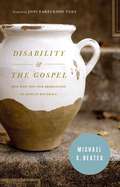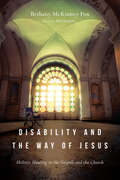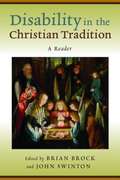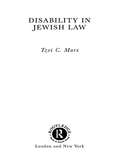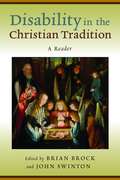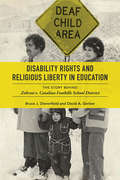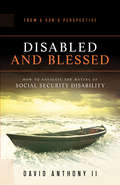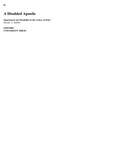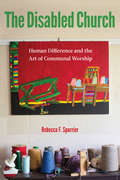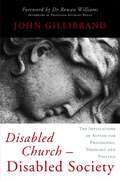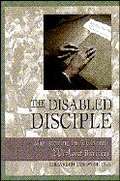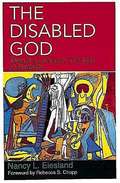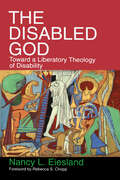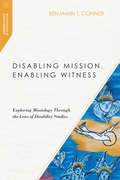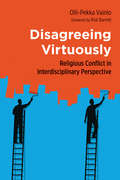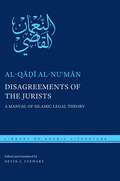- Table View
- List View
Dirty Secrets, Dirty Lies: Escape the Web of Deceit That Holds You Back
by Ray TraylorDon’t Let a Dirty Secret Block Your Way to Success!What’s holding you back from achieving your full potential for Christ? Usually we hide our struggles out of shame or guilt. If you or someone you love has a dirty secret, then this book is for you. Learn how to:• Tap into God’s unlimited power• Be controlled by your faith and will, not by your feelings• Visualize yourself as the man or woman God intends you to be• Thrive no matter what life throws at you• Never be caught off guard by the difficulties of life• Overcome shame, guilt, anger, anxiety, and depression• Create a supportive environment in which you will flourishHere are a few examples of more than a dozen case studies you’ll find in Dirty Secrets, Dirty Lies. These people overcame their obstacles by applying these principles. You can, too!• Jared’s journey to recovery started when he realized that gambling is a losing proposition.• Josh and Brittney discovered the underlying issue that convinced them they must train their son to be good.• Joey learned the hard way that infatuation can wreck your emotions and that it is easy to be tricked.• Amy’s husband discovered how to help her understand how worries had paralyzed her.• Margie learned how ministering to others could help her overcome her weight problem.• When Richard’s church practiced “tough love,” he became less abusive and more loving.• Stephanie learned to trust God when she realized God really cared about her .For over 35 years, Ray Traylor has ministered to hundreds of people individually and in small groups. He is a conference speaker and workshop leader for churches and Christian organizations. He is happily married to Brenda Traylor, and together they have five adult children and one grandson.
Dis-Enclosure: The Deconstruction of Christianity (Perspectives in Continental Philosophy)
by Bettina Bergo Jean-Luc Nancy Michael B. Smith Gabriel MalenfantThis book is a profound and eagerly anticipated investigation into what is left of a monotheistic religious spirit—notably, a minimalist faith that is neither confessional nor credulous. Articulating this faith as works and as an objectless hope, Nancy deconstructs Christianity in search of the historical and reflective conditions that provided its initial energy. Working through Blanchot and Nietzsche, re-reading Heidegger and Derrida, Nancy turns to the Epistle of Saint James rather than those of Saint Paul, discerning in it the primitive essence of Christianity as hope. The “religion that provided the exit from religion,” as he terms Christianity, consists in the announcement of an end. It is the announcement that counts, however, rather than any finality. In this announcement there is a proximity to others and to what was once called parousia. But parousia is no longer presence; it is no longer the return of the Messiah. Rather, it is what is near us and does not cease to open and to close, a presence deferred yet imminent. In a demystified age where we are left with a vision of a self-enclosed world—in which humans are no longer mortals facing an immortal being, but entities whose lives are accompanied by the time of their own decline—parousia stands as a question. Can we venture the risk of a decentered perspective, such that the meaning of the world can be found both inside and outside, within and without our so-immanent world? The deconstruction of Christianity that Nancy proposes is neither a game nor a strategy. It is an invitation to imagine a strange faith that enacts the inadequation of life to itself. Our lives overflow the self-contained boundaries of their biological and sociological interpretations. Out of this excess, wells up a fragile, overlooked meaning that is beyond both confessionalism and humanism.
Disability Advocacy Among Religious Organizations: Histories and Reflections
by Albert A HerzogGain insight into the importance of advocacy for the disabled within various religious and secular organizationsYou shall love your neighbor as yourself. (Romans 13:9) Through the years, religious organizations have worked to fulfill this biblical mandate. Disability Advocacy Among Religious Organizations: Histories and Reflections chronicles the progress of different ministries&’ advocacy for the disabled since 1950 as they worked toward fulfilling this mission. This enlightening history of several religious organizations&’ efforts charts the trends in advocacy while offering readers insight into ways to assist people with disabilities both within religious organizations and in society. Issues are explored by drawing upon numerous documents, communications, and in-depth reviews of the advocates&’ work.This book draws together in a single volume the stories of various religious organizations and their struggles to advocate for the disabled. Because of society&’s tendency to isolate and fear them, special needs individuals such as the mentally and physically disabled have long found it difficult to be accepted, understood, or to receive proper care. However, ministries strive to be advocates for all of their members and their needs, including education, treatment, and appropriate legislation. Disability Advocacy Among Religious Organizations: Histories and Reflections recounts the steps organizations have taken to focus on ending isolation and fear through inclusion and appropriate care of members with various disabilities. These historical accounts examine the depth, breadth, and on-going need for disability advocacy in religious organizations.Disability Advocacy Among Religious Organizations: Histories and Reflections discusses the advocacy backgrounds of: the World Council of Churches the National Council of Churches National Catholic Partnership on Disability National Apostolate for Inclusion Ministry American mainline Protestant denominations-the American Baptist Convention, Disciples of Christ, the Episcopal Church, the Evangelical Lutheran Church in America, the Presbyterian Church USA, the United Methodist Church, and the United Church of Christ the Christian Reformed Church American Association on Mental Retardation (AAMR) Religion and Spirituality Division Bethesda Lutheran homes and Services, Inc. the Christian Council on Persons with Disabilities (CCPD) Friendship Ministries Joni and Friends the Mennonite advocacy for persons with disabilities the Religion and Disability Program of the National Organization on DisabilityDisability Advocacy Among Religious Organizations: Histories and Reflections is valuable reading for clergy and laypeople in disability advocacy in religious organizations, educators, students, seminary students preparing for ministries, and religious historians.
Disability And Christian Theology: Embodied Limits And Constructive Possibilities
by Deborah Beth CreamerAttention to embodiment and the religious significance of bodies is one of the most significant shifts in contemporary theology. In the midst of this, however, experiences of disability have received little attention. This book explores possibilities for theological engagement withdisability, focusing on three primary alternatives: challenging existing theological models to engage with the disabled body, considering possibilities for a disability liberation theology, and exploring new theological options based on an understanding of the unsurprisingness of human limits. The overarching perspective of this book is that limits are an unavoidable aspect of being human, a fact we often seem to forget or deny. Yet not only do all humans experience limits, most of us also experience limits that take the form of disability at some point in our lives; in this way,disability is more "normal" than non-disability. If we take such experiences seriously and refuse to reduce them to mere instances of suffering, we discover insights that are lost when we take a perfect or generic body as our starting point for theological reflections. While possible applicationsof this insight are vast, this work focuses on two areas of particular interest: theological anthropology and metaphors for God. This project challenges theology to consider the undeniable diversity of human embodiment. It also enriches previous disability work by providing an alternative to the dominant medical and minority models, both of which fail to acknowledge the full diversity of disability experiences. Mostnotably, this project offers new images and possibilities for theological construction that attend appropriately and creatively to diversity in human embodiment.
Disability and Religious Diversity
by Darla Schumm Michael StoltzfusThis edited collection of essays critically examines how diverse religions of the world represent, understand, theologize, theorize and respond to disability and/or chronic illness. Contributors employ a wide variety of methodological approaches including ethnography, historical, cultural, or textual analysis, personal narrative, and theological/philosophical investigation.
Disability and the Church: A Vision for Diversity and Inclusion
by Lamar HardwickLamar Hardwick was thirty-six years old when he found out he was on the autism spectrum. While this revelation helped him understand and process his own experience, it also prompted a difficult re-evaluation of who he was as a person. And as a pastor, it started him on a new path of considering the way disabled people are treated in the church. Disability and the Church is a practical and theological reconsideration of the church's responsibilities to the disabled community. Too often disabled persons are pushed away from the church or made to feel unwelcome in any number of ways. As Hardwick writes, "This should not be." He insists that the good news of Jesus affirms God's image in all people, and he offers practical steps and strategies to build stronger, truly inclusive communities of faith.
Disability and the Gospel: How God Uses Our Brokenness To Display His Grace
by Michael S. BeatesMichael Beates's concern with disability issues began nearly 30 years ago when his eldest child was born with multiple profound disabilities. Now, as more families like his are affected by a growing number of difficulties ranging from down syndrome to autism to food allergies, the need for church programs and personal paradigm shifts is greater than ever. Working through key Bible passages on brokenness and disability while answering hard questions, Michael offers helpful principles for believers and their churches. He shows us how to embrace our own brokenness and then to embrace those who are more physically and visibly broken, bringing hope and vision to those of us who need it most.
Disability and the Muslim Perspective: An Introduction for Rehabilitation and Health Care Providers
by Rooshey Hasnain Laura Cohon Shaikh Hasan ShanawaniThis publication will fill a void in the literature on disability intended for use by rehabilitation and health care professionals. We highlight both the difficulties and successes that Muslims with disabilities experience as they seek access to the opportunity to live a meaningful life. The growing number and diversity of Muslims in the United States challenges disability and health care providers and researchers to understand this population's perspectives, experiences and ways of practicing Islam, particularly relative to health care, disability and rehabilitation.
Disability and the Way of Jesus: Holistic Healing in the Gospels and the Church
by Bethany McKinney FoxWhat does healing mean for people with disabilities? The Gospels are filled with accounts of Jesus offering physical healing. But even as churches today seek to follow the way of Jesus, people with disabilities all too often experience the very opposite of healing and life-giving community: exclusion, judgment, barriers. Misinterpretation and misapplication of biblical healing narratives can do great damage, yet those who take the Bible seriously mustn't avoid these passages either. Bethany McKinney Fox believes that Christian communities are better off when people with disabilities are an integral part of our common life. In Disability and the Way of Jesus, she considers how the stories of Jesus' healings can guide us toward mutual thriving. How did Jesus' original audience understand his works of healing, and how should we relate to these texts today? After examining the healing narratives in their biblical and cultural contexts, Fox considers perspectives from medical doctors, disability scholars, and pastors to more fully understand what Jesus does as he heals and how he points the way for relationships with people with disabilities. Personal reflections from Christians with disabilities are featured throughout the book, which concludes with suggestions for concrete practices adaptable to a variety of church settings. Bridging biblical studies, ethics, and disability studies with the work of practitioners, Fox provides a unique resource that is both theologically grounded and winsomely practical. Disability and the Way of Jesus provides new lenses on holistic healing for scholars, laypeople, and ministry leaders who care about welcoming all people as Jesus would.
Disability In The Christian Tradition: A Reader
by Brian Brock John SwintonFor two millennia Christians have thought about what human impairment is and how faith communities and society should respond to people with perceived impairments. But never has one volume collected the most significant Christian writings on disability. This book fills that gap. Brian Brock and John Swinton's Disability in the Christian Tradition brings together for the first time key writings by thinkers from all periods of Christian history - including Augustine, Aquinas, Julian of Norwich, Luther, Calvin, Hegel, Kierkegaard, Bonhoeffer, Barth, Hauerwas, and more. Fourteen contemporary experts in theology and disability studies guide readers through each era or group of thinkers, offering clear commentary and highlighting important themes.
Disability in Jewish Law (Jewish Law In Context Ser. #No.3)
by Tzvi C. MarxIn recent decades, record numbers of Jews are taking a newfound interest in their legal heritage - the Bible and the Talmud, the law codes and the rabbinical responsa literature. In the course of this encounter, they may be interested in how these sources relate to the issue of disability, and the degree to which halakhic attitudes to disability are in harmony with contemporary sensibilities. For example, can the blind or those in wheelchairs serve as prayer leaders? Need the mentally incompetent observe any ritual law? Is institutionalization in a special-education facility where Jewish dietary laws are not observed permitted if it will enhance a child's functioning? And how are we to interpret teachings that seem inconsonant with current sensibilities? Disability in Jewish Law answers the pressing need for insight into the position of Jewish law with respect to the rights and status of those with physical and mental impairments, and the corresponding duties of the non-disabled.
Disability in Judaism, Christianity, and Islam
by Darla Schumm Michael StoltzfusThis edited collection of essays critically examines how diverse religions of the world represent, understand, theologize, theorize and respond to disability and/or chronic illness. Contributors employ a wide variety of methodological approaches including ethnography, historical, cultural, or textual analysis, personal narrative, and theological/philosophical investigation.
Disability in the Christian Tradition: A Reader
by John Swinton Brian BrockFor two millennia Christians have thought about what human impairment is and how faith communities and society should respond to people with perceived impairments. But never has one volume collected the most significant Christian writings on disability. This book fills that gap. Brian Brock and John Swinton's Disability in the Christian Tradition brings together for the first time key writings by thinkers from all periods of Christian history - including Augustine, Aquinas, Julian of Norwich, Luther, Calvin, Hegel, Kierkegaard, Bonhoeffer, Barth, Hauerwas, and more. Fourteen contemporary experts in theology and disability studies guide readers through each era or group of thinkers, offering clear commentary and highlighting important themes.
Disability Rights and Religious Liberty in Education: The Story behind Zobrest v. Catalina Foothills School District (Disability Histories #12)
by Bruce J. Dierenfield David A. GerberIn 1988, Sandi and Larry Zobrest sued a suburban Tucson, Arizona, school district that had denied their hearing-impaired son a taxpayer-funded interpreter in his Roman Catholic high school. The Catalina Foothills School District argued that providing a public resource for a private, religious school created an unlawful crossover between church and state. The Zobrests, however, claimed that the district had infringed on both their First Amendment right to freedom of religion and the Individuals with Disabilities Education Act (IDEA). Bruce J. Dierenfield and David A. Gerber use the Zobrests' story to examine the complex history and jurisprudence of disability accommodation and educational mainstreaming. They look at the family's effort to acquire educational resources for their son starting in early childhood and the choices the Zobrests made to prepare him for life in the hearing world rather than the deaf community. Dierenfield and Gerber also analyze the thorny church-state issues and legal controversies that informed the case, its journey to the U.S. Supreme Court, and the impact of the high court's ruling on the course of disability accommodation and religious liberty.
Disability Rights and Religious Liberty in Education: The Story behind Zobrest v. Catalina Foothills School District (Disability Histories)
by Bruce J. Dierenfield David A. GerberIn 1988, Sandi and Larry Zobrest sued a suburban Tucson, Arizona, school district that had denied their hearing-impaired son a taxpayer-funded interpreter in his Roman Catholic high school. The Catalina Foothills School District argued that providing a public resource for a private, religious school created an unlawful crossover between church and state. The Zobrests, however, claimed that the district had infringed on both their First Amendment right to freedom of religion and the Individuals with Disabilities Education Act (IDEA). Bruce J. Dierenfield and David A. Gerber use the Zobrests' story to examine the complex history and jurisprudence of disability accommodation and educational mainstreaming. They look at the family's effort to acquire educational resources for their son starting in early childhood and the choices the Zobrests made to prepare him for life in the hearing world rather than the deaf community. Dierenfield and Gerber also analyze the thorny church-state issues and legal controversies that informed the case, its journey to the U.S. Supreme Court, and the impact of the high court's ruling on the course of disability accommodation and religious liberty.
Disabled and Blessed
by David Anthony IIHope and Help for Those in Need A practical and personal guide to the social security disability process Disability can be devastating. Sickness, accident, or injury can change anyone's life unexpectedly. And when it does you face not only physical but financial and emotional challenges too. Help is available, but finding it can demand strength, hope, and perseverance just when they seem to be in shortest supply. Inspired by his mother's own struggle to secure the assistance she was due after a debilitating surgery, David Anthony presents the information and inspiration needed to guide you through the social security disability process—for yourself or a loved one. Equal parts handbook, guide book, and personal workbook, Disabled and Blessed tells you: Who to contact (government departments, organizations, professionals) What to expect (procedures and time frames) How to navigate the system (applications and appeals) Where to find support (personal care) Disabled and Blessed will help you access the practical and personal resources necessary to ensure a purposeful life despite practical limitations.
A Disabled Apostle: Impairment and Disability in the Letters of Paul
by Isaac T. SoonSpeculation around the health of Paul the Apostle has been present since soon after his death. Recently scholars have understood Paul to be disabled but have been wary of isolating precisely what his disabilities may have been or whether they are important for understanding his writings. <p><p>This book is the first full-length study of Paul the Apostle and disability. Using insights from contemporary disability studies, Isaac Soon analyses features of Paul's body in his ancient Mediterranean context to understand the ways in which his body was disabled. Focusing on three such ancient disabilities--demonization, circumcision, and short stature--this book draws on a rich variety of ancient evidence, from textual sources and epigraphy, to ancient visual culture, to analyze ancient bodily ideals and the negative cultural effects such 'deviant' persons generated. The book also examines Paul's use of his own disabilities in his letters and shows how disability is not subsidiary to his thought but a central aspect of it. <p><p>This book also provides scholars with a new method for uncovering previously unrecognized disabilities in the ancient world. Last of all, it critiques the latent ableism in much New Testament scholarship, which assumes that the figures of the early Jesus movement were able-bodied.
The Disabled Church: Human Difference and the Art of Communal Worship
by Rebecca F. SpurrierHow do communities consent to difference? How do they recognize and create the space and time necessary for the differences and disabilities of those who constitute them? Christian congregations often make assumptions about the shared abilities, practices, and experiences that are necessary for communal worship. The author of this provocative new book takes a hard look at these assumptions through a detailed ethnographic study of an unusual religious community where more than half the congregants live with diagnoses of mental illness, many coming to the church from personal care homes or independent living facilities. Here, people’s participation in worship disrupts and extends the formal orders of worship. Whenever one worships God at Sacred Family Church, there is someone who is doing it differently.Here, the author argues, the central elements and the participation in the symbols of Christian worship raise questions rather than supply clear markers of unity, prompting the question, What do you need in order to have a church that assumes difference at its heart?Based on three years of ethnographic research, The Disabled Church describes how the Sacred Family community, comprising people with very different mental abilities, backgrounds, and resources, sustains and embodies a common religious identity. It explores how an ethic of difference is both helped and hindered by a church’s embodied theology. Paying careful attention to how these congregants improvise forms of access to a common liturgy, this book offers a groundbreaking theology of worship that engages both the fragility and beauty revealed by difference within the church. As liturgy requires consent to difference rather than coercion, an aesthetic approach to differences within Christian liturgy provides a frame for congregations and Christian liturgists to pay attention to the differences and disabilities of worshippers. This book creates a distinctive conversation between critical disability studies, liturgical aesthetics, and ethnographic theology, offering an original perspective on the relationship between beauty and disability within Christian communities. Here is a transformational theological aesthetics of Christian liturgy that prioritizes human difference and argues for the importance of the Disabled Church.
Disabled Church - Disabled Society
by John GillibrandIn this moving and intelligent book John Gillibrand, an Anglican priest, draws on his experience of caring for his non-verbal son, Adam, who has autism and is now a teenager. He reflects on how the experience has changed not just his life, but also his whole way of thinking about theology, politics and philosophy. Illuminated by an account of his day to day experiences with Adam, and deeper reflection upon the meaning of that experience, John Gillibrand considers the challenges that autism - and disability in general - present to the western tradition of thought in theology and philosophy. His experiences lead him to consider the place of people with autism in relation to religion and philosophy, and how the difficulties in providing adequate public services for those with autism and their carers point to a need for radical transformation of western political structures. This thoughtful and incisive book will be of interest to theologians, philosophers and sociologists, as well as to all those trying to integrate people with autism into society. Parents and carers will find much to reflect on. Shortlisted for the Michael Ramsey Prize for theological writing 2013.
The Disabled Disciple: Ministering in a Church Without Barriers
by Elizabeth J. BrowneElizabeth Browne, a doctor of theology explores how the bible represents people with disabilities and how the church represents people with disabilities. Good book for ministers, or just people interested in Christianity who are blind or disabled.
The Disabled God: Toward A Liberatory Theology Of Disability
by Nancy L. EieslandDraws on themes of the disability-rights movement to identify people with disabilities as members of a socially disadvantaged minority group rather than as individuals who need to adjust. Highlights the hidden history of people with disabilities in church and society. Proclaiming the emancipatory presence of the disabled God, the author maintains the vital importance of the relationship between Christology and social change. Eiesland contends that in the Eucharist, Christians encounter the disabled God and may participate in new imaginations of wholeness and new embodiments of justice.
The Disabled God: Toward a Liberatory Theology of Disability
by Nancy L. EieslandDraws on themes of the disability-rights movement to identify people with disabilities as members of a socially disadvantaged minority group rather than as individuals who need to adjust. Highlights the hidden history of people with disabilities in church and society. Proclaiming the emancipatory presence of the disabled God, the author maintains the vital importance of the relationship between Christology and social change. Eiesland contends that in the Eucharist, Christians encounter the disabled God and may participate in new imaginations of wholeness and new embodiments of justice.
Disabling Mission Enabling Witness: Exploring Missiology Through the Lens of Disability Studies (Missiological Engagements)
by Benjamin T. ConnerHow would it look if we "disabled" Christian theology, discipleship, and theological education? Benjamin Conner initiates a new conversation between disability studies and Christian theology and missiology, imagining a church that fully incorporates persons with disabilities into its mission. In this vision, people with disabilities are part of the church's pluriform witness, and the congregation embodies a robust hermeneutic of the gospel.
Disagreeing Virtuously: Religious Conflict in Interdisciplinary Perspective
by Olli-Pekka VainioDisagreement is inevitable, particularly in our current context, marked by the close coexistence of conflicting values and perspectives in politics, religion, and ethics. How can we deal with disagreement ethically and constructively in our pluralistic world? In Disagreeing Virtuously Olli-Pekka Vainio presents a valuable interdisciplinary approach to that question, drawing on insights from intellectual history, the cognitive sciences, philosophy of religion, and virtue theory. After mapping the current discussion on disagreement among various disciplines, Vainio offers fresh ways to understand the complicated nature of human disagreement and recommends ways to manage our interpersonal and intercommunal conflicts in ethically sustainable ways.
Disagreements of the Jurists: A Manual of Islamic Legal Theory (Library of Arabic Literature #53)
by al-Qāḍī al-NuʿmānA masterful overview of Islamic law and its diversityAl-Qadi al-Nu'man was the chief legal theorist and ideologue of the North African Fatimid dynasty in the tenth century. This translation makes available in English for the first time his major work on Islamic legal theory, which presents a legal model in support of the Fatimids’ principle of legitimate rule over the Islamic community. Composed as part of a grand project to establish the theoretical bases of the official Fatimid legal school, Disagreements of the Jurists expounds a distinctly Shi'i system of hermeneutics, which refutes the methods of legal interpretation adopted by Sunni jurists. The work begins with a discussion of the historical causes of jurisprudential divergence in the first Islamic centuries, and goes on to address, point by point, the specific interpretive methods of Sunni legal theory, arguing that they are both illegitimate and ineffective. While its immediate mission is to pave the foundation of the legal Isma'ili tradition, the text also preserves several Islamic legal theoretical works no longer extant—including Ibn Dawud’s manual, al-Wusul ila ma'rifat al-usul—and thus throws light on a critical stage in the historical development of Islamic legal theory (usul al-fiqh) that would otherwise be lost to history.A bilingual Arabic-English edition.
